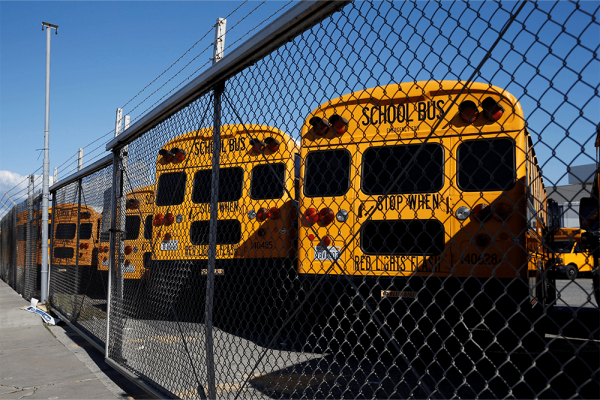This Tuesday marked back to school day for my two boys, who are entering fourth and sixth grade at an Episcopal school that welcomes students of all faiths. The annual rite — which for our family always seems to involve the Mission: Impossible-style task, led by my wife, of getting all the right books and school supplies in time — left me with mixed feelings, which I suspect many fellow parents share. On one hand, I am excited for all the new school year offers my kids: new teachers, new friends, a new season of athletics, and all the other extracurricular activities that bring my kids so much joy. On the other, I feel the weight of a mounting crisis in our nation’s education system, especially in public schools, where the pandemic revealed such deep and long-standing racial inequities.
I grew up in public schools and fervently believe that public education is one of the most important investments we should make to advance the common good. Yet as a parent who is fortunate enough to have the option of sending my kids to a private school — a decision my wife and I did not make lightly — I am acutely aware of the inequity between my kids’ school and most public schools in the greater Washington, D.C., area. The school my kids attend was able to manage the disruptive challenges of the pandemic relatively well with state-of-the-art remote learning technology and, once school resumed in-person, the ability to offer students weekly COVID-19 tests and outdoor options for lunch. These and other advantages should have been standard for kids across the country. But that was far from the case.
A recent study on the impact of COVID-19 on student achievement paints a sobering picture: Students in schools located in high poverty areas experienced longer periods of remote learning than students in more affluent schools. Students in high poverty schools also experienced greater levels of learning loss from remote learning than students in low poverty schools with similar amounts of remote learning. Given the United States’ persistent levels of income and wealth inequality along racial lines, the students suffering from the highest levels of pandemic era learning loss are disproportionately students of color. Over the first two years of the pandemic, national data showed that math scores dropped for the first time since the test measuring them was introduced in the 1970s. Yet these declines were not equally felt: Math scores for Black students fell 13 points compared to 5 points for white students.
To be clear: The fact that remote learning led to learning loss does not mean that school districts made the wrong decision. Protecting kids, teachers, and parents from a virus that has claimed over a million lives in this country (and is still killing several hundred people in the United States every day) was paramount, especially during the worst of the winter infection surges and before teachers and students alike could be fully vaccinated. But Thomas Kane, one of the researchers of the study on COVID-19 and student achievement, said it well, telling NPR: “That student achievement declined [due to remote learning] is not a surprise. Rather, we should think of it as a bill for a public health measure that was taken on our behalf. And it’s our obligation now … to pay that bill.”
Unfortunately, this year’s return to school is not only accompanied by the imperative to help students catch up on learning lost to the pandemic but also with a teacher shortage caused by unconscionably low salaries in most school districts and a growing culture war over what students are taught about the United States’ past and present. Like learning loss, this teacher shortage is much worse in less affluent school districts and those with more students of color. In Arizona, which pays teachers less than the national average, nearly one-third of teaching positions remained vacant last year. Per Bloomberg, a June survey given to members of the American Federation of Teachers union revealed that “almost 2 in 5 teachers plan to quit in the next two years,” citing low salaries as the primary reason but also due to the stress of teaching during the pandemic and “a lack of respect as schools have become the latest political battleground.”
So what can we do? In the short term, parents should be asking their children’s teachers and school administrators how they can best help and support them. Here in Washington, D.C., school employees hosted a “call-a-thon” to help remind parents to ensure their kids are all up-to-date on their vaccinations. In California’s Bay Area — where housing prices are extremely high — one school district asked parents to consider renting out their rooms to local teachers and staff.
We should also be advocating at the local and state level to increase teacher salaries — yes, even if you don’t have kids, or your kids go elsewhere, or it means higher taxes. The Bible is clear about the importance of education and the value of teachers: “Though it cost all you have, get understanding,” states Proverbs 4, “...hold on to instruction, do not let it go; guard it well, for it is your life.” Surely our children’s future is worth investing in to adequately compensate teachers and resource our schools for success.
And it also means looking at some of the most persistent drivers of inequality in the field of education — not least of which is the way local property values often dictate the size of public-school budgets. For example, states rather than localities could collect property taxes and distribute those funds equitably to school districts based on the needs of each district rather than the affluence of the district’s residents. We should also continue to push back against harmful legislation at the state level that seeks to politicize our schools and constrain our teachers by limiting what they are allowed to teach and talk about, whether it takes the form of Florida’s “Don’t Say Gay” law or state laws that use the boogeyman of “critical race theory” to prevent teachers from teaching the whole truth of American history.
Our nation is failing the test of investing in and prioritizing the future of its children when it disrespects and fails to value and affirm its teachers. It’s time to let teachers do their jobs with dignity, respect, and greater support. We need to show them some love, which means not just increasing teacher pay, but also resisting the unjust policies that are politicizing teaching and making their already difficult jobs harder. As we come through this pandemic, we must commit to valuing teachers and advancing greater equity within our education system. These two sacred commitments will enable us to build a new normal in which every child is valued and given the tools and resources to flourish and realize their full potential.
Got something to say about what you're reading? We value your feedback!






